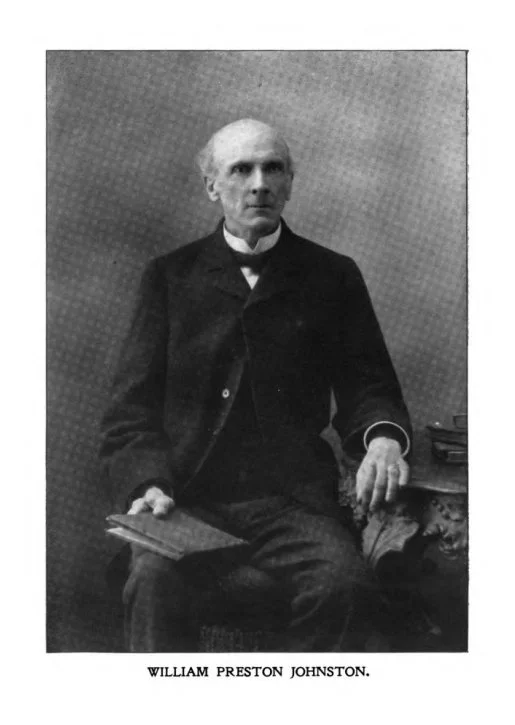Letter from William Preston Johnston to the Editor of the Washington and Lee University Southern Collegian (1874)
[A former professor at Washington and Lee University, William Preston Johnston laments the post-war state of the South. He stresses the importance of alumni patronage and urges Washington and Lee alumni to devote their resources to aid the school. For more information, visit Washington and Lee Special Collections.]
(William Preston Johnston | SOURCE: W&L Spectator)
Lexington, Va.
June 24, 1874
Messrs. Editors:
It gives me pleasure to respond to your request for my views as to the prospects of Washington and Lee University. Supposing your request to be based in part upon my resignation of the Chair I have held for nearly eight years in the University, I avail myself of your columns to make known, what you are already aware of, that my resignation is due to reasons purely personal, and in no manner whatever to want of accord with the Board of Trustees and Faculty, or to lack of interest in the success of this great and noble University.
It is not to be denied that certain discouraging facts exist, which ought to be looked at squarely. The first is the diminution of the number of matriculates. The chief reason of this is plain enough in the impoverished condition of the South, which is due mainly to bad government and political oppression. It is a discouragement in which all our sister Institutions share, and which can be wholly remedied only by a removal of the causes.
But another reason is the foundation and growth of numerous Colleges, of more or less merit and of a certain influence in their respective spheres and localities. This is natural, and not altogether undesirable even in a selfish point of view; as the higher Universities must eventually be benefited by the raising of the standard of culture and the diffusion of classical and scientific education, though for the present these colleges must diminish somewhat the patronage of the leading Universities. The remedy for this is to be found in offering those superior educational advantages, that have thus far marked our leadership in progress and power among Southern Institutions of learning.
But to continue to hold this precedence, two things are requisite; patronage and money. It is an ungracious fact, from the proclamation of which the College Authorities naturally shrink, that every student costs annually some fifty or sixty dollars more than he pays into the treasury of the University. This deficit made up in part by the interest on the endowments of its benefactors; but there is an unascertainable sum due by students, and represented only in the privations and sacrifices of inadequately paid Professors. As universities are created for the advancement of education, patronage, whether remunerative or not is necessary to their existence. Now how are money and students to be obtained for the building up of Washington and Lee? The main reliance of every great American Institution is its Alumni. Harvard and Yale receive annually vast amounts, the sum of small contributions of graduates, who keep up an active and continued interest in their growth and prosperity.
Of course our impoverished people cannot do so much, but they can do something; their zeal can compensate for their lack of wealth. This University, without State aid, does a work that only large grants could properly recompense; and now that I am no longer pecuniarily interested, I beg leave to venture the opinion that is a reproach to the Commonwealth of Virginia that it has never given one cent in return for the multiplied benefits conferred upon it by an Institution peculiarly the creation of the two greatest men ever born upon her soil—Washington and Lee. Private effort must supply the failure of public gratitude.
Judged from any human standpoint, in material wealth the South is a ruined country. What war spared tyranny has gleaned. In its moral energies is the only hope of its people. Chief among the agencies of redemption is education; and if each Alumnus will consider himself as an agent of the University——-nay, as consecrated to the rescue of our land from ignorance and impending barbarism—no human standard can measure the possible result of the next few years. Our afflictions teach us. Let our Alumni emulate the example of their brethren of Memphis. In that plague-stricken city, in the time of its great trial, they bound themselves to stand by one another with purse and strength and fraternal comfort, to help the needy, to nurse the sick, and to bury the dead; and the sanction of their act was a pledge of loyality and devotion to their Alma Mater. Can you doubt that if animated by this spirit your Alma Mater is safe; or, with wider view, that “there is life in the old land yet.”
In conclusion I may say that, so far as I can ascertain, the number of students will be increased next year, and something may be effected for the financial improvement of the University; but these results will not satisfy the reasonable expectations of our people. They expect—they demand——that the large plans of Gen. Lee shall be carried to completion; and that Washington and Lee shall be not only the representative University of the South, but the worthy peer of the most powerful and useful of American Institutions of learning.
Very Respectfully,
Wm. Preston Johnston

